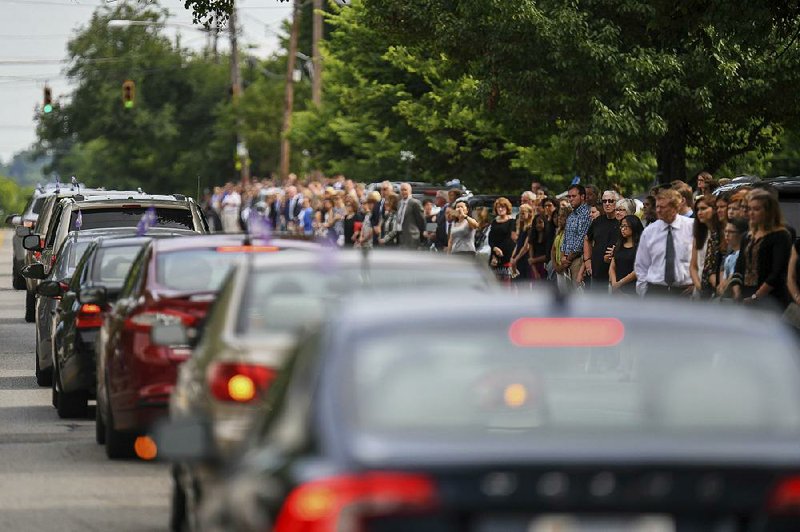Thousands attend Warmbier funeral
WYOMING, Ohio -- Mourners gathered Thursday as loved ones of Otto Warmbier, an American college student who was detained in North Korea for over a year and died shortly after returning home in a coma, shared stories about his affinity for hugs, thrift-store clothes shopping and little-known rap music.
More mourners lined the street, with some holding signs of support and pressing the tips of their thumbs together to form a "W," as a hearse carried away the coffin after Warmbier's funeral at a school in his hometown of Wyoming, near Cincinnati. A rabbi officiated at the service, which was closed to news media.
So many showed up that officials had to turn about 100 people away once roughly 2,000 had filled an auditorium, cafeteria and gym for the service. Warmbier's passport and jacket were on display as mourners signed a memorial book.
The attendees included Ambassador Joseph Yun, the U.S. special envoy who traveled to Pyongyang to bring Warmbier back to the U.S., and U.S. Sen. Rob Portman, a Republican from the Cincinnati area.
North Korea accused Warmbier of trying to steal a propaganda banner while he was visiting North Korea in 2015, which resulted in his conviction on a subversion count.
'Pizzagate'-driven gunman gets 4 years
WASHINGTON -- An online conspiracy theory dubbed pizzagate ended Thursday when a North Carolina man was sentenced to prison for arming himself with an assault rifle, traveling to the nation's capital and firing his weapon inside a neighborhood pizza restaurant.
Edgar Maddison Welch's "ill-conceived plot" last year did "actual damage to the lives of real people," a judge said before sentencing him to four years in prison.
Judge Ketanji Jackson said she'd never seen a case like Welch's, and she gave him a punishment on the upper end of guidelines, in part to send a message to others. If Welch believed an Internet conspiracy theory that children were being harmed at the restaurant, he should have notified law enforcement, not attempted to take the law into his own hands, the judge said during Thursday's hearing in U.S. District Court in Washington.
Jackson said it was "sheer luck" that no one was physically injured when Welch, 29, entered Washington's Comet Ping Pong restaurant on Dec. 4 armed with a rifle and a revolver. He was there to investigate unfounded Internet rumors about the harboring of child sex slaves at the restaurant.
Virginian said to give China secret files
ALEXANDRIA, Va. -- A Virginia man caught with $16,500 in cash in his carry-on luggage was charged Thursday with transmitting top-secret documents to an apparent Chinese agent.
Kevin Mallory, 60, of Leesburg was arrested Thursday and made an initial appearance in U.S. District Court in Alexandria, Va. The self-employed consultant who speaks Chinese is charged under the federal Espionage Act and could face life in prison. Indeed, if certain conditions are met, the charges could make Mallory eligible for the death penalty, prosecutor John Gibbs said at Mallory's initial appearance.
Court records indicate that Mallory was an Army veteran and worked as a special agent for the Diplomatic Security Service at the U.S. State Department from 1987-90. Since 1990, he has worked for a variety of government agencies and defense contractors, according to the affidavit. He held top-secret security clearance until he left government service in 2012.
Court limits citizenship-stripping lies
WASHINGTON -- The Supreme Court on Thursday limited the government's ability to strip U.S. citizenship from foreigners for lying during the naturalization process.
The justices ruled unanimously in favor of an ethnic Serb from Bosnia who lied about her husband's military service.
Justice Elena Kagan wrote for the court that false statements can lead to the revocation of citizenship only if they "played some role in her naturalization."
The court rejected the position taken by the Trump administration that even minor lies can lead to loss of citizenship.
The woman, Divna Maslenjak, and her family were granted refugee status in 1999 and settled near Akron, Ohio, in 2000. She became a citizen in 2007.
She initially told immigration officials her husband had not served in the Bosnian Serb military. That was a lie, she later conceded, and lower courts upheld a criminal conviction against her. The conviction automatically revoked her citizenship, and she and her husband were deported in October.
The high court returned the case to the 6th U.S. Circuit Court of Appeals in Cincinnati to determine whether Maslenjak's false statements made a difference in the decision to grant her citizenship in the first place.
A Section on 06/23/2017

